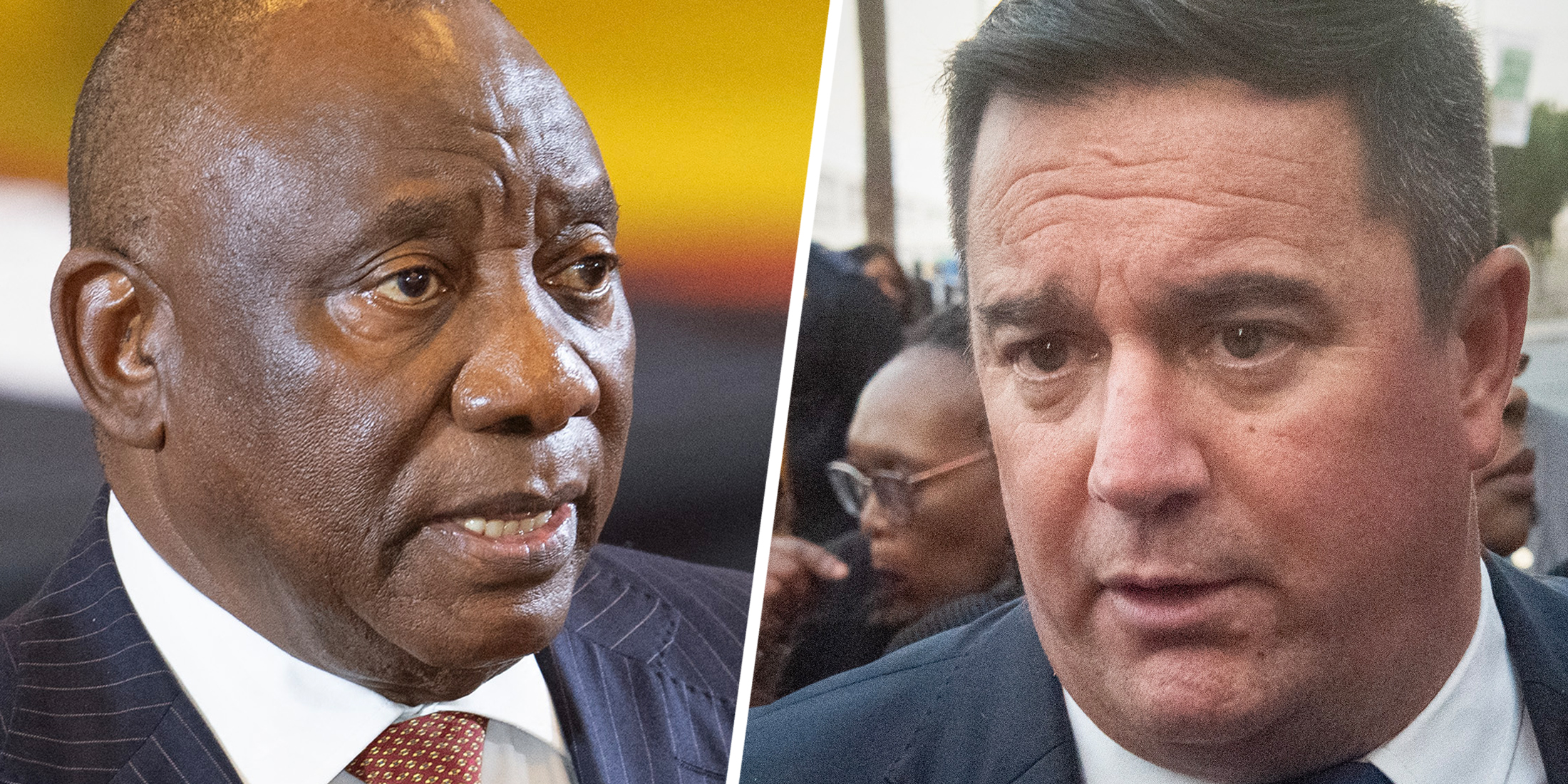The Democratic Alliance (DA) - the second-biggest party in the Government of National Unity (GNU) - has declared a dispute and called for a reset of the GNU’s relationship with the ANC following the signing of the Expropriation Bill into law this week by President Cyril Ramaphosa.
The DA claims the Bill was signed into law despite a legal opinion from DA minister Dean Macpherson showing it did not pass constitutional muster.
DA leader John Steenhuisen, fresh from a trip to the World Economic Forum (WEF) in Switzerland, briefed the media on Saturday, 25 January, in Cape Town.
The press conference comes after President Cyril Ramaphosa on Thursday signed into law the Expropriation Bill, which the Presidency explained on Thursday was the result of a five-year process of public consultation and parliamentary deliberation.
As Rebecca Davis reported on Friday, the Presidency stressed that negotiations between the government and the seller must take place on “reasonable terms”.
It stated: “In terms of this law, an expropriating authority may not expropriate property arbitrarily, or for a purpose other than a public purpose or in the public interest.”
The DA is against the Act and, in a letter to President Ramaphosa, objected to the signing of the Act on the basis that a legal opinion sought by Public Works and Infrastructure Minister Dean Macpherson (DA) found the Act to be unconstitutional and contradictory.
Instead, the DA wants the Act to be sent back to Parliament.
Adding fuel to the GNU fire, Steenhuisen claimed that Health Minister Aaron Motsoaledi allegedly told delegates this week at the WEF that he would declare “war” against people who “did not want their medical aids expropriated”. The DA is also against the National Health Insurance (NHI) Bill for many reasons, including that it is not funded.
Read more: Expropriation Bill: decades in the making, what lies ahead for South Africa?
On Saturday, Steenhuisen said the party would invoke Clause 19 of the Statement of Intent, a document which was signed by all GNU leaders. The reason, Steenhuisen outlined, was “because South Africa deserves a functioning coalition, where partners treat each other with respect in pursuit of solutions to our country’s many pressing problems”.
This clause, Steenhuisen explained, referred to the procedures around disputes and reaching sufficient consensus to solve them. According to Steenhuisen, sufficient consensus existed when the parties to the GNU representing 60% of the seats in the National Assembly agreed on issues.
“The only parties in the GNU that together represent 60% of seats in the GNU are the ANC and the DA,” said Steenhuisen, who serves as the country’s agriculture minister in the GNU.
“The President needs to accept that his party is now just another minority party, and that the DA are partners in the GNU,” said Steenhuisen, adding: “we won over 3.5 million votes, and we are in the government to represent our voters and to rescue South Africa.”
“If we cannot fulfil this mandate inside the GNU, we will have to seriously consider our next steps … the DA will not, under any circumstances, be reduced to being mere spectators.
“I want the people of South Africa to know that the DA does not take this step lightly … The seriousness of this situation demands that we engage other parties in the GNU too, such as the IFP, which has publicly come out against the Expropriation Act too.”
When pressed by journalists if this was an ultimatum, Steenhuisen confirmed this was indeed an ultimatum. But he added: “Partners don’t give each other ultimatums, but this is a very clear call for a mature reset of the relationships within the Government of National Unity so that all of us can feel part of the decision-making and feel heard.”
On Friday, the Freedom Front Plus, another party to the GNU, asked parties that voted against the Expropriation Bill “to join hands” and test its constitutionality at the country’s ConCourt.
Steenhuisen said they welcomed any process “that leads to the constitutional determination of the Bill”.
The Inkatha Freedom Party (IFP), another GNU party that also rejected the Bill, said on Friday that the President should have sent the Bill to the GNU Clearing House, which is there to sort out political differences within the GNU.
When Daily Maverick asked if the DA had considered this as an alternative, Steenhuisen replied with: “Now let me be clear. The clearing House is no substitute for the very important Section 19 that was included in the original statement.”
Steenhuisen then claimed that the Clearing House has no terms of reference that have been adopted as yet.
At the same time, he said: “We’re happy to talk on whatever forums, but we are now invoking Section 19, which was specifically agreed to by all parties who signed the statement of intent.”
When asked by journalists if legal proceedings have started, DA national spokesperson Willie Aucamp said the DA gave instructions to lawyers to draft papers to test the constitutionality of the Act.
“The Democratic Alliance made it very clear that we will do everything in our power to fight this and going to court is one of those steps,” said Aucamp. DM




 From left: President Cyril Ramaphosa. (Photo: Rodger Bosch / AFP) | DA leader John Steenhuisen. (Photo: Rodger Bosch / AFP)
From left: President Cyril Ramaphosa. (Photo: Rodger Bosch / AFP) | DA leader John Steenhuisen. (Photo: Rodger Bosch / AFP)